Arnhem Land artists scoop awards and indigenous women take the spotlight at the 2010 Indigenous Music Awards
Indigenous Music Awards 2010
World Music Themes at Rainforest World Music Festival 2009
10 July 2009, Kuching.The sounds of World Music are intriguing backed by quaint strains of faraway bands playing with strange-looking musical instruments. What is more fascinating is the meaning behind the songs. We explore more into some of the stories and emotions that are carried in the songs performed at the 12th Rainforest World Music Festival held at the Sarawak Cultural Village.
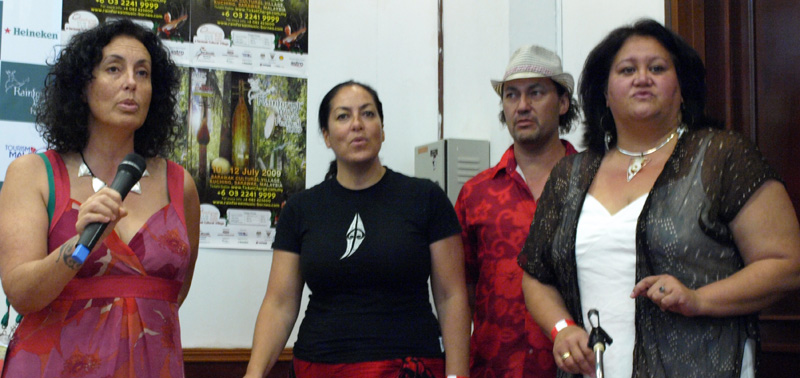
Moana & The Tribe from New Zealand.
For Moana & The Tribe, the Kiwis tell us that their songs are about spirituality, the environment and ancestors. “We see ourselves as guardians of the land and culture, the link between ancestors and the future,” says Moana the singer, composer and leader of the 12-piece band.
Her songs reflect the struggles faced by the Maoris.“Songs are a medium of storytelling; and we use songs to tell of the struggles of our tribes being marginalized.” She refers to the colonization of New Zealand were the Maori culture was chipped at and eroded.
A few songs question the state of things. One song, says Moana, urges “the keeping of traditional Maori names of mountains and rivers alive, formally and legally, not just within our people”. She spoke about the British renaming a mountain that was once called Aoraki to Mt Cook. Aoraki is the highest mountain in New Zealand at 3,754m in the Southern Alps.
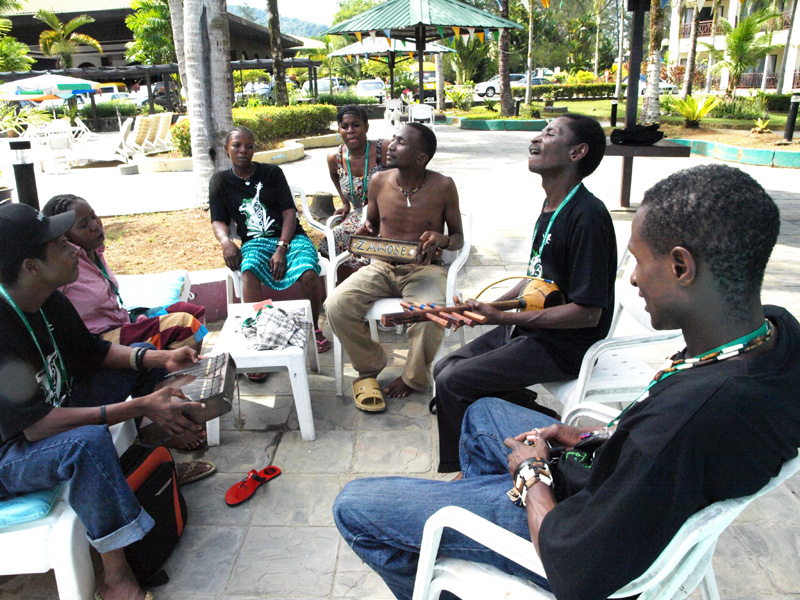
The Zawose family rehearsing poolside.
The song “Moko” addresses the difference between moko (Maori tattoo) and contemporary tattoo, to drive home the point that there is meaning in every indigenous moko carved on the skin of the Maoris. This is not to be dealt with flippantly or misused.
Vasco from Dazkarieh says his music unravels the differentways people relate to each other. He hopes to take a new approach in forging the relations between people. Some songs are about working in the field, and some religious. The Portuguese band revives songs played well before an oppressive Portugal regime 40 yrs ago that banned ethnic music.
The Zawose Family sings in Kigogo, their native dialect in Tanzania, retaining the old flavours of the African country before Swahili was nationalized as a unifying language. The late Hukwe Zawose composed songs that stirred the hearts of the people in taking pride in their country.

Robert Zawose
“We sing about the land, about nature, about people coming together, about life,” smiles Robert Zawose, then points to the tree. “See as we sing, even birds are coming.”
Even while keeping to age-old rhythm, listeners can appreciate their songs about the sufferings involved in the Hiroshima bombing as well as HIV disease. “Sumbu” is about how a woman feels when her child has lost her way, then is struck with memories of her difficult childbirth.
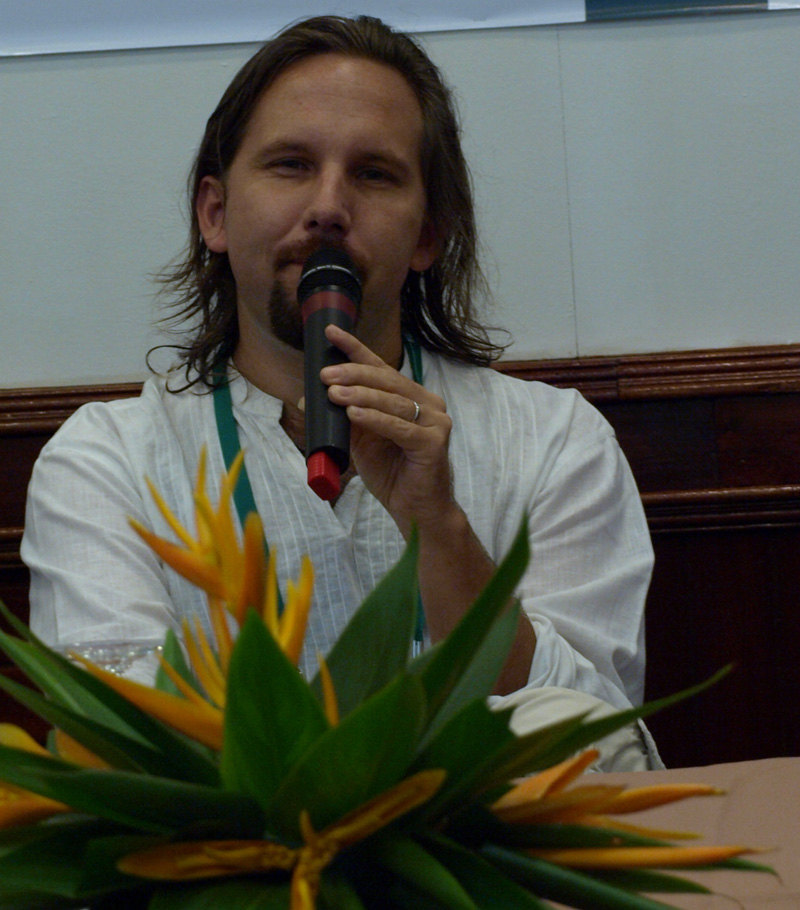
Akasha's James
Akasha from cosmopolitan Malaysia is a “rojak” instrumental band with skills in world music, classical and Latin Jazz. It becomes more interesting when the players who are ethnically Indians, Chinese and Caucasian playtraditional Malay music like the joget, and more contemporary tunes like blues, funk, jazz and Latin.
Guitarist James thinks music need not always have a story or a meaning. “Music has the effect of bringing out a story within people when they listen to it. It pretty much lies in the eye of the beholder; it's not limited by our own vision of it.”
Photos by Mallika Naguran.
See related articles on Gaia Discovery: Interview with festival director Randy Raine-Reusch on 2009 surprising finds; challenges faced by Sarawak Tourism Board before the opening of the 12th Rainforest World Music Festival.
Rainforest World Music Festival Puts Sarawak on the Map
Spirits Soar at Sarawak Rainforest World Music
by Mallika Naguran
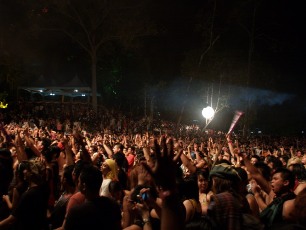
What’s a Rainforest Festival without some rain?
That’s the attitude that got half the audience up on their feet, grooving at the 11th Sarawak Rainforest World Music Festival 2008. Squelching ankle-deep mud could not stop them, while the rest – families, locals, foreigners from around the world – picnicked on sheets and mats on drier grounds, enjoying the party atmosphere from afar.
After all, this was the time they had waited oh so impatiently to be at Sarawak where the magic of music uncurls. Torrential rain on the opening day after ten consecutive years of great weather marked a first; in fact, organizers considered it bad timing. It was very, very, very wet.
However, musician Jean Claude from Kasai Masai was of the mind that it was auspicious. “If you don’t mind, I will tell you that in Congo where we come from originally, it rains everyday. This is because of the equatorial rainforest which is a lot bigger that Sarawak’s. Let me tell you that we, performing here for the first time, have brought our rainforest spirit with us. It is no coincidence.”
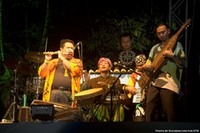
Tuku Kame of Sarawak.
It is hardly coincidental that the event brought together diverse spirits and cultures to produce colliding sound waves.
Foreign bands, 12 of them, and five local groups, oozed non-stop wide-ranging sounds such as traditional, folk, fusion, Celtic, rock, Baul and Socca.
The performers were New Rope String Band (United Kingdom), Yakande (Gambia/Guinea), Pinikpikan (The Philippines), Adel Salameh (Palestine), Ross Daly Quartet (Greece), Fadomorse (Portugal), Kasai Masai (Congo), Hiroshi Motofuji (Japan), Oikyataan (India), Beltaine (Poland), Sheldon Blackman and The Love Circle (Trinidad & Tobago).
Malaysian bands were Akasha, Anak Jati Bisaya Orchestra, Kan’id, Senida and Tuku Kame.

Pinikpikan thumps through hearts.
Appreciating the spirit of the community, environment, even the wild, form part of Pinikpikan’s life values. Guitarist and group director Samy of Pinikpikan talked about whales being poached and killed, and his song Butan Ding renders this point. “It’s a huge beast, yet it is vegetarian, eating plankton. So why kill it?” he asked.
The eight-member band from The Philippines spread the message of whale protection with traditional musical instruments such as the tungatong (bamboo shaker), derbuka (drum) and kutyati (two-stringed instrument from Mindanao) with Western instruments through an eclectic mix such as Afro-Cuban, Arabic and Asian.
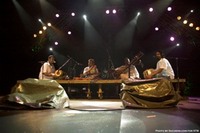
Hendrix reinvented with Akasha.
They were among the youngster favourites who also included Akasha (Malaysia), Beltaine, Kasai Masai and Sidney
Sheldon over the three-day concert from 11-13 July at Sarawak Cultural Village in Santubong. Taiko drummer Hiroshi Motofuji put on a pounding performance with a spread of drums, including the Indian mridhangam with mastery of interpretation.
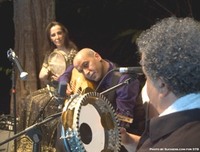
Adel Salameh trio thrill.
Oud player Adel Salameh’s finger work held me in awe, accompanied by wild honey vocalist Naziha Azzouz, an Algerian. I especially enjoyed watching their unassuming drummer play expertly on the tambourine in the opening solo – a simple instrument we often take for granted – yet capable of soaring the spirit.
Photos by Foto Polo Singapore (www.travel-Malaysia.com) and Suchens.com for Sawarak Tourism Board.
Make plans now to attend the 12th Sarawak Rainforest Music Festival on 10-12 July 2009. Fringe events being planned in town, plus spend time at the world craft bazaar and folk art forum. Hotels get full during the event, so make plans early. And while you are in Sarawak, visit their many eco destinations.
Coming soon: recommended eco destinations in Kuching and Sarawak.
Malaysia Boleh - Penang World Music Festival
Story by Mallika Naguran

Penang rocks!
To paraphrase, it’s “Malaysia can”. This arm-thrusting slogan was coined to reflect Malaysia’s sentiment to conquer all odds.
Politicians grunt it, and so do foreign music performers, apparently, when they feel the masses move beneath their hands.
And move they did the hearts, bodies and minds of bright-eyed Asian folks at the second annual Penang World Music Festival held at the charming quarry garden flanking the Botanical Gardens in Penang Island. Young and old bobbed and grooved to the strains, vocals and rhythm of 11 international bands from Croatia, Reunion Islands, France, Kenya, Denmark, Tibet (famed and exiled Techung), Mexico, Iran, India, Canada and US of A. See line up below and watch this section for album reviews and interviews.
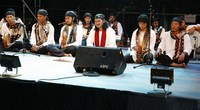
Rhythmic percussion by Kumpulan Dendang Anak.
The infectious Kumpulan Dendang Anak of Trengganu, one of the four Malaysian bands to be featured, roused the crowds to their feet with their gendangs, rebanas, konpangs and more. They proved that age-old traditions and heritage still, to this day, send a tingle. “We brought back folk music that existed 600-700 years ago that would have otherwise gone extinct,” beamed leader and performer Zulkifli Ismail who blends gongs and gamelans with the acoustic guitar.
“Everybody plays for tradition,” said Gilberto Guttierez of Mexican Mono Blanco, adding that where they come from, the farm, that is, happy hour equals song, dance and music, of course.

DYA Singh passes down generations of hymns.
Tradition need not be boring or out of date, and this perhaps is the beauty of world music where a bit of experimentation
fuses myriad of tones from different sound boxes. It doesn’t matter where it comes from, what it’s made of or which century it originated in. The tabla for instance, an ethnic Indian percussion instrument, served centre stage in DYA Singh played by world-renowned Nepalese-born Dheeraj Shrestra. The group mixes beats of tabla with Greek bouzouki, harmonium and the Australian didgeridoo. “The beauty of the group is the spirit of the music, dance and rhythm,” says Dheeraj. Watch Dheeraj perform this 10 May at Nepalese Pagoda, South Bank, Brisbane.
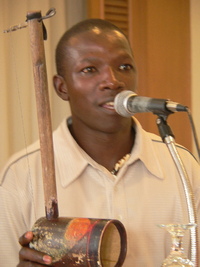
George Achiem resurrects oruto's appeal in Kenge Kenge.
Kenge Kenge’s dynamic leader and lead vocalist George Achiem resurrected a dying string instrument he saw being played in the market when he was a little boy. The one-string oruto provides a feminine counterpoint to pounding beats, between booming drums and calls of the rustic horn of this band from sunripe Kenya. “The whole band uses traditional instruments, some with eight strings, some with one. We really love our culture,” he grinned.
And so did we. For three days, Malaysians and tourists, even invited journalists, were mesmerized by the mind-blowing cultural experience. “This is what world music should be, full of ordinary people, children and screaming teenagers appreciating the acts, most of which are of very high standard,” said Singapore writer, actor and musician Joe Ng. “I stopped going to WOMAD of Singapore few years back because it became such a soulless, yuppie thing.”
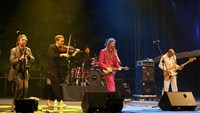
Electric and eclectic Afenginn infuse wild Nordic folk with Finnish nuances on the mandolin.
Even the absence of alcohol sale on the grounds did not deter anyone from getting a bit high during the three-day packed concert beginning May 2.
The music itself did the trick in lifting the spirits and screwing the brains (blame it on the Danish lot, Afenginn) with traditional instruments, lilting folklore, syncopated beats, surreal chants and head banging rhythms.
George Achiem best sums up the value of upholding traditions. “When we play our music overseas, we leave a bit of our culture behind and we learn new cultures from others.” This cultural exchange binds people together as they see beyond their inner worlds to understand and appreciate different perspectives.
“Music is the universal language, man,” said Brian the keyboardist of Techung as he pumped fists with Mame Khan, Badila’s Rajahstani singer at the post concert party. “I didn’t understand what you sang, man, but you know what, it didn’t matter. It’s all in the music, man.”
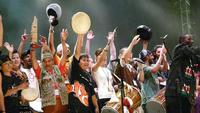
Music is the universal language.
I couldn’t agree more. If I were you, I’d make a date for the next Penang World Music Festival about the same time next year. Don’t forget to stay on for a few more days as Penang is lovely and harbours the best Malaysian food, like my favourite spicy sour assam laksa. Or if you can’t wait that long, head on down to the sizzling Sarawak Rainforest Festival 11-13 July. Book now to avoid disappointment - it’s a sell out I hear.
Akan Datang! Watch this space for more world music previews and reviews. View show video and more photos in Gallery.
Coming up soon: Afenginn on cheerful melancholy and rational madness. Only they can make this happen. Listen to their tracks here.
Coming up sooner: Internationally-acclaimed Techung writes the songs for Tibetan freedom
Gaia Discovery Rates the Show
Friday May 2 Day One
DYA SINGH (PENANG & AUSTRALIA) ***
TEADA (IRELAND) ****
KUMPULAN DENDANG ANAK (TERENGGANU, MALAYSIA) ***
MONO BLANCO (MEXICO) **
AFENGINN (DENMARK) *****
SALEM TRADITION (REUNINON ISLANDS) *****
Saturday May 3 Day Two
KUMPULAN KINABALU MERSU SOUND (SABAH) **
BADILA (IRAN, INDIA, FRANCE) ***
GALANT, TU PERDS TON TEMPS (CANADA) ***
DIPLOMATS OF DRUMS (KUALA LUMPUR, MALAYSIA) *
KRIES (CROATIA) ***
Sunday May 4 Last Day
TECHUNG (TIBET) ***** Watch videos
BALFA TOUJOURS (USA) ***
LO COR DE LA PLANA (FRANCE) *****
AFENGINN (DENMARK) *****
* Loo time
** Nice, but where’s the oomph?
*** You got me
**** Yeah baby yeah
***** Call the police. Roof is falling down here!
This show was made possible by the Ministry of Tourism Malaysia and Penang Tourism Action Council. It was made successful with resourceful festival artistic director Yeoh Jun-Lin and brilliant sound producer Niall Macaulay of Cheer Productions.
Photos by Joe Ng, Tourism Malaysia and Mallika Naguran